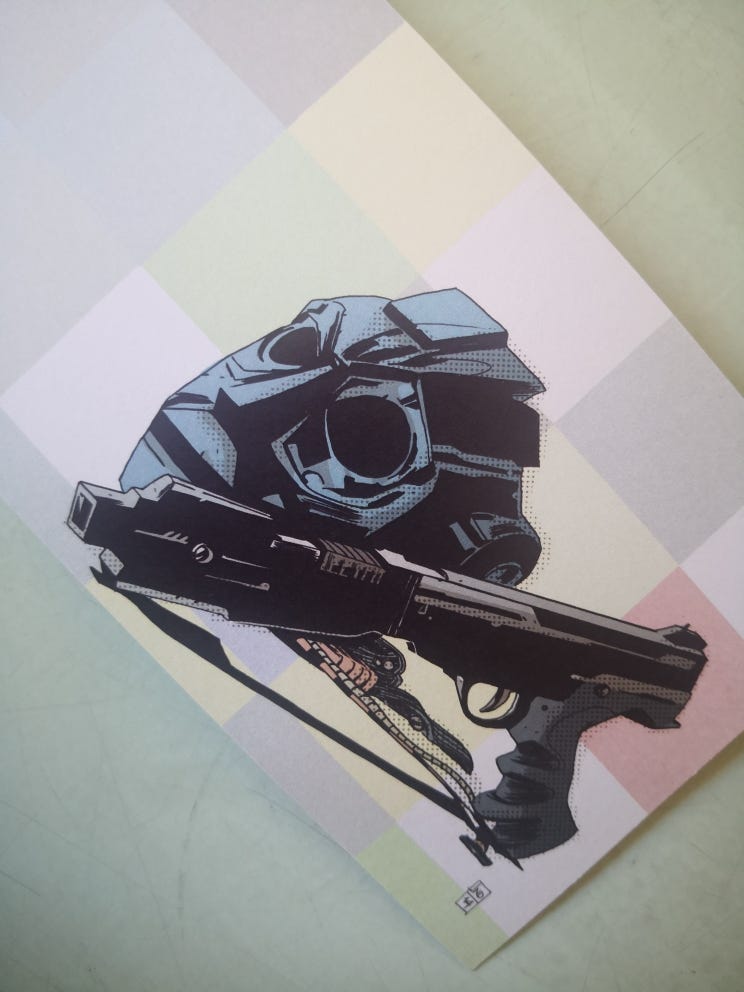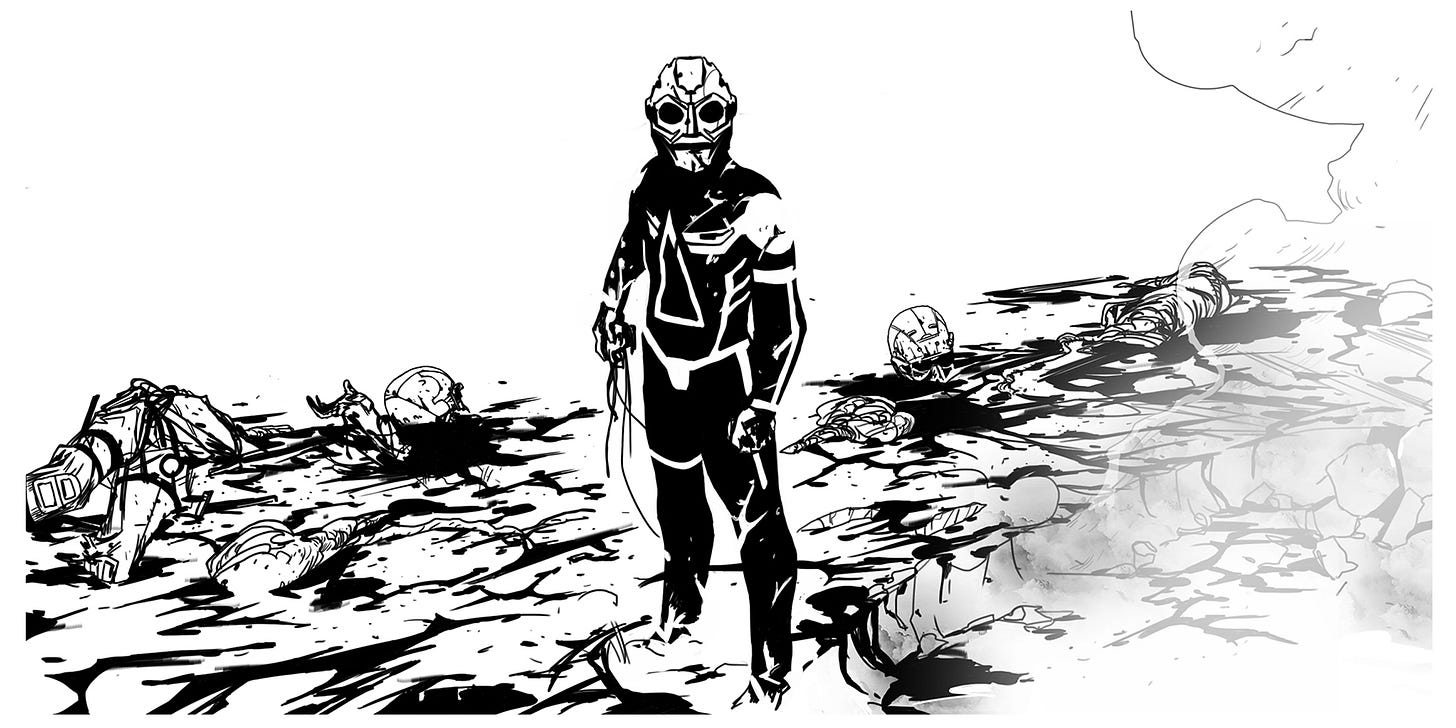I’ve just about had enough of you.
Chapter 117: We have an idea...
Telling stories is easy. You just need an idea.
This is Part II of our exploration of the new comic Stefano Landini and myself are making. For now it is codenamed Project: Digital/Analog and you can read Part I here if you missed it.
The mind of a writer is a funny thing. We are thinking of ideas for stories all the time. Constantly contemplating worlds we want to explore, genres we want to play in, characters we want to create, dialogue we want to hear. The desire to find the next thing that excites us instead of working on what we’re supposed to be doing is actually a problem for many writers. But sometimes, for whatever awful reason, when someone asks, “what would you like to make next?” your brain just shuts off. Or at least mine did, when Stefano asked me that.
I had a million projects in folders and notes in the back of my mind. But none of them felt “right” for something we would create together. So, like a child trying to avoid getting caught not having done their homework I asked, “Well, what would you like to make next?” You could view this as a cheap attempt to buy some time until my brain unfucked itself and a suitable idea could be put forth, but in this case Stefano came back with an answer right away, before I could come up with something.
He wanted to work on a character he designed a few years earlier for a project in Italy that he ended up not making. He sent me some art. No explanation. Just art.
I was in love. A badass mask and a weirdass gun. That’s all it took. He sent along more art, but I was already sold. Who wears this mask and what do they do? That’s all I could think about. I needed the answers, even if it meant I was the one who had to make them up.
I loved working with Stefano before. Loved his work, loved the energy he brought to a page, and loved his style. But this was new to me. He was making something entirely new, and it felt fresh, and cool, and vibrant, and I so desperately wanted to be a part of it. I could say that I think more cool ideas should have their place in the world, or that I liked Stefano and wanted to give his work a slightly bigger chance to be in the spotlight if I could, and that is all true. But the real thing is that I’m selfish and I saw the chance to make something incredible with him and I didn’t want to let it go.
So, we began. We started sending each other ideas back and forth in that hurried, flirtatious rush that comes from two people excitedly discovering something together. Stefano sent me sketches, thoughts on what he was going to do with the character and who they might be. I sent back my own thoughts, sometimes just a line or two. And from there a story started to take shape. Or at least a character.
I had some thoughts on tone. And genre. And style. And I sent them to Stefano and he told me that yes, that was all in line with what he was thinking. I breathed a sigh of relief. But what we didn’t have was a plot. We had passed a big hurdle and now we just had open road in front of us. Expansive, endless, empty, terrifyingly open road.
There is a joke writers have. It’s the question “Where do you get your ideas?” We’ve all been asked it; my guess is comic writers more than most. But people who don’t tell stories for a living ask it all the time, I would assume because it seems mystifying to just birth an idea into the world. People who ask the question seem to approach the concept of writing from either one of two places. Either it is some sort of dark magic that is perhaps unknowable but worth asking about. If you were on the subway with Gandalf you’d ask him how makes stuff float or whatever, right? Or they think of writing like it’s some puzzle that has a secret trick to it, and writers might just be willing to part with this secret if they’re in a good mood. Like those people who can solve a Rubik’s cube in under a minute. The question is asked so much but no one in the history of the world has ever been satisfied with the answer. It is the ultimate setup for disappointment. But the reason we writers don’t give a good answer, and the reason we all laugh about the question, is a simple one. It’s not that it’s a dumb question. It’s that we don’t have any fucking idea what the answer is.
Well, not in a reliable way at least. Ideas come from anywhere, at any time. Or maybe everywhere. For me they come when I’m listening to music, reading, going for a walk, trying to fall asleep, trying to do a different project that is on a deadline. Most of us don’t control them or summon them, despite our deepest desires to. Ideas just happen to us like car crashes. So when I was asked to come up with a story for this design that Stefano cared about so much I felt a lot of pressure, and that’s not conducive to coming up with stories. If I could write better with a gun aimed at my head head you’d best believe I’d be paying a sniper to sit on the roof across the street from my apartment all day. Instead it’s just some pigeons who stare at me, mocking me.
But just like everything else in the origin of this project, the story finally came to me in a different way. Staring at Stefano’s gorgeous and intriguing art I just suddenly knew what I wanted to do. It wasn’t a sliver of an idea, or a loose concept, or something fleeting I had to chase and fight to tame. It came to me, fully formed but a little fuzzy around the edges, like I was reciting a book I’d read a long time ago. It was born complete.
As I sat there and looked at all Stefano’s sketches and unused pages I began telling myself the idea over and over. I was going over it to see if it made sense, because I couldn’t believe it did. I’ve written a lot of comics. A few hundred probably. I don’t really know. And this was the first time I’d had an idea come to me like this, so fully formed. So I needed to make sure it was really something new and I wasn’t just regurgitating something else without realizing. I really didn’t want to send Stefano my idea and have him write back “Isn’t that the plot of The Highlander?” or something of that nature. Once I’d spent enough time with it and was sure it was actually “mine” I hurriedly typed it up and sent it to him. And then I held my breath.
I felt so much pressure for him to like this, because I liked it so much. And it came from his amazing art. And so, I wanted needed him to care about this as much as I did. And then he wrote me back. He had questions. He had thoughts. But he was in. We had our book.
We spent the next few weeks with him doing a few more designs and me taking his notes and thoughts and merging them with my ideas. And then I got the call…
While we were working on this project as something to do while we waited patiently for Marvel to give us the go ahead to make our U.S.Agent book that was paused during the start of the pandemic, it turns out Marvel had decided to get someone else to write the book. Our editor on the project had been furloughed temporarily and the book had moved to another office, and I guess I didn’t make the move with it. These things happen. As a fan of the character, I was pleased to see that they put one of my favorite writers on the book to replace me. As a fan of eating and paying my rent I was less pleased, but so it goes. Eventually Stefano left the book too, but like U.S.Agent, that’s not my story to tell.
But now we had nothing stopping us from making our book. This wide-open road in front of us, an idea we were both excited about, and nothing in our way…
Except life.
NEXT: We start work and we stop work.
That’s it for now. I hope you’re enjoying this look at the origin of Project: Digital/Analog. Stay tuned for more soon.
And also we’re about to start unveiling the next Ashcan Press project on here. The creation and production will be handled very differently than anything else I’ve ever done and I think it will be something very unique and cool and you all are going to have front row seats. It’s gonna be weird. Get excited.
Stay safe. Take care of each other. Make comics.
-Matthew Rosenberg
NYC 5/31/23









Matt, is this a book that you'll be releasing to subscribers only on Substack?
Oooh epic! Intriguing. Excited to hear more 👀